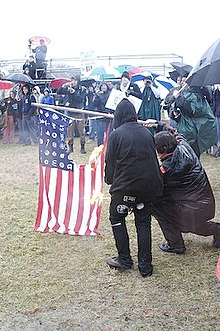Flag Desecration Amendment
The flag desecration amendment ( flag desecration supplement [sartikel] ), also known as flag burning amendment known is a proposed Amendment to the Constitution of the United States . The new article would empower Congress to criminalize desecration of the flag . Since the peace movement leading to the Vietnam War, the proposal has repeatedly become the subject of political disputes, in which the fundamental right of freedom of expression is usually confronted with the need for protection by national symbols .
history
The first law to protect the flag was passed by Congress in 1968 and was directed directly against demonstrations by anti-Vietnamese opponents. In the years that followed, 48 out of 50 states passed similar laws to protect the flag. However, the Supreme Court ruled in 1989 in its ruling on the Texas v. Johnson with five to four votes that these laws represent an unconstitutional restriction on freedom of expression and are therefore void.
After the verdict, Congress passed a new law that became part of the 1990 United States v. Eichman was also ruled unconstitutional by the Supreme Court. The court ruled that the burning of the flag falls under the protection of freedom of expression. The distribution of votes in this judgment was the same as in the previous one.
As a result of these two judgments, there have been new attempts in Congress each session to overturn the Court's judgment on a constitutional amendment. Since 1995, the proposal has received the necessary two-thirds majority in the House of Representatives for every vote , but if there was a vote, it failed every time in the Senate due to the existing majorities. The last time this happened was on June 27, 2006 with a result of 66:34.
text
The proposed article, as tabled several times in the United States House of Representatives , reads:
"The Congress shall have power to prohibit the physical desecration of the flag of the United States"
"Congress has the power to prohibit the physical desecration of the flag of the United States"
argumentation
For the constitutional amendment
The advocates of the amendment see the flag as the most important national symbol of the United States, so desecration / burning of the flag is a serious insult to all US citizens.
Former Chief Justice William H. Rehnquist , in his dissenting opinion on the above-mentioned judgment in the Texas v. Johnson summarized as follows:
“The American flag, then, throughout more than 200 years of our history, has come to be the visible symbol embodying our nation. It does not represent the views of any particular political party, and it does not represent any particular political philosophy. The flag is not simply another 'idea' or 'point of view' competing for recognition in the marketplace of ideas. Millions and millions of Americans regard it with an almost mystical reverence regardless of what sort of social, political, or philosophical beliefs they may have. I cannot agree that the First Amendment invalidates the Act of Congress, and the laws of 48 of the 50 States, which make criminal the public burning of the flag. "
“The American flag has become a visible symbol of our nation over more than 200 years of our history. It does not represent the views of any political party or philosophy. The flag is not just another 'idea' or 'point of view' competing for attention in the marketplace of ideas. Millions upon millions of Americans have an almost mystical reverence for her, no matter what social, political or philosophical conviction they hold. I cannot subscribe to the belief that the first amendment invalidates both the majority vote in Congress and the laws of 48 of the 50 states that criminalize public burning of the flag. "
Against the constitutional amendment
The main argument of opposition, including civil rights groups, is that the requested ban would go against the very principles that the flag symbolizes. Only authoritarian regimes arrest protesters who publicly burn flags. So wrote Judge William R. Brennan in the majority opinion of United States v. Eichman :
'If there is a bedrock principle underlying the First Amendment, it is that the Government may not prohibit the expression of an idea simply because society finds the idea itself offensive or disagreeable.' Johnson, supra, at 414. Punishing desecration of the flag dilutes the very freedom that makes this emblem so revered, and worth revering.
"If there is an irrevocable principle in the first amendment, it is that the state cannot prohibit the expression of an idea simply because society looks at it offensive or disgusting." (from Texas v. Johnson) Prohibiting the desecration of the flag weakens the freedom, which is why this symbol is revered and admirable. "
It is also noted that in the Texas v Johnson case, it was not the actual ban on flag-burning that was deemed unconstitutional, but the ban on related political expression. In reality, the proposed amendment was not directed against flag desecration, but against the expression of political opinion. This is seen as a clear contradiction to the first amendment to the constitution, which among other things ensures freedom of expression.
Burning flags is an accepted tradition among veterans' organizations and boy scouts, but in accordance with the United States Flag Code as a respectful way of disposing of a flag. This law contains the passage:
"The flag, when it is in such condition that it is no longer a fitting emblem for display, should be destroyed in a dignified way, preferably by burning."
"A flag that is no longer in a presentable condition should be destroyed in a dignified manner, preferably by burning."

